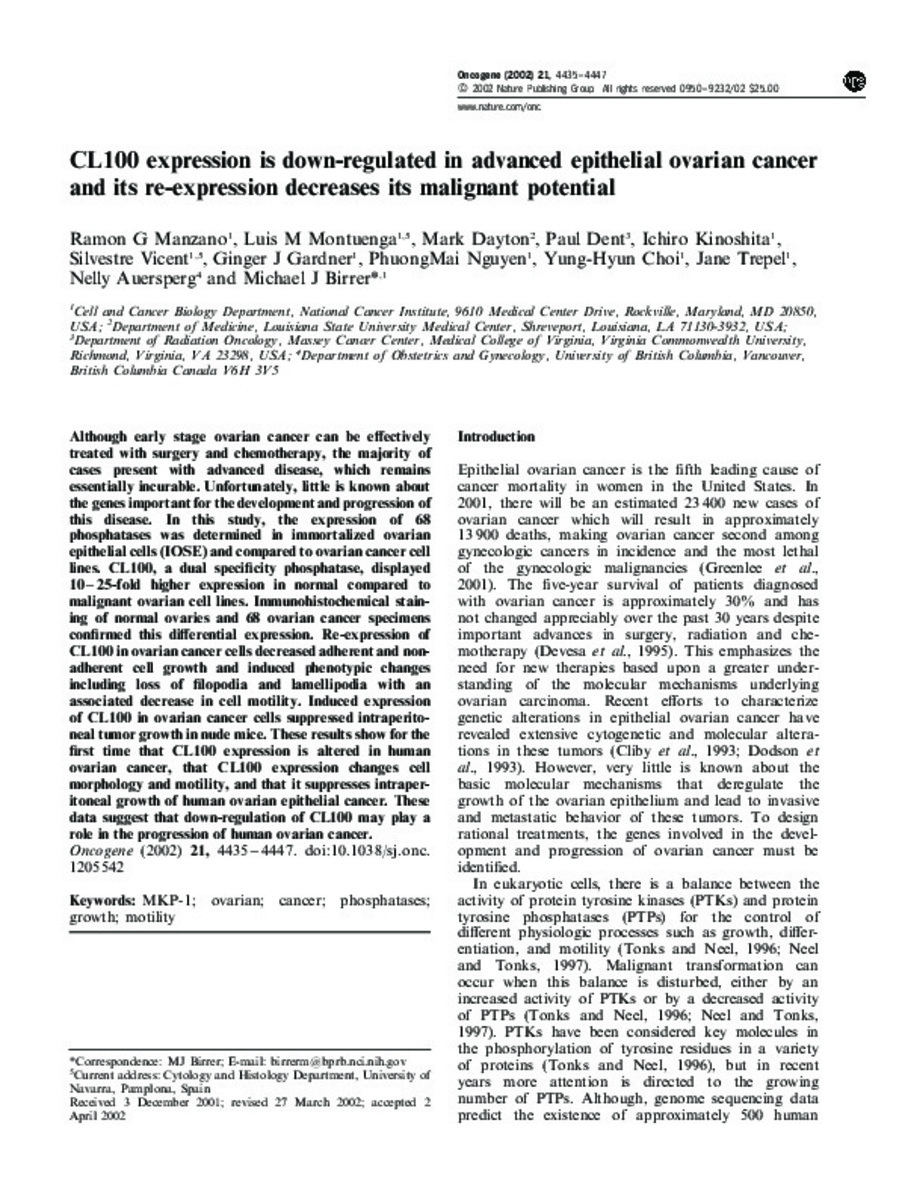Full metadata record
| DC Field | Value | Language |
|---|---|---|
| dc.creator | Manzano, R.G. (Ramón G.) | - |
| dc.creator | Montuenga-Badia, L.M. (Luis M.) | - |
| dc.creator | Dayton, M. (M.) | - |
| dc.creator | Dent, P. (P.) | - |
| dc.creator | Kinoshita, I. (Ichiro) | - |
| dc.creator | Vicent, S. (Silvestre) | - |
| dc.creator | Gardner, G.J. (Ginger J.) | - |
| dc.creator | Nguyen, P. (PhuongMai) | - |
| dc.creator | Choi, Y.H. (Yung-Hyun) | - |
| dc.creator | Trepel, J. (Jane) | - |
| dc.creator | Auersperg, N. (N.) | - |
| dc.creator | Birrer, M.J. (Michael J.) | - |
| dc.date.accessioned | 2011-12-12T09:03:43Z | - |
| dc.date.available | 2011-12-12T09:03:43Z | - |
| dc.date.issued | 2002 | - |
| dc.identifier.citation | Manzano RG, Montuenga LM, Dayton M, Dent P, Kinoshita I, Vicent S, et al. CL100 expression is down-regulated in advanced epithelial ovarian cancer and its re-expression decreases its malignant potential. Oncogene 2002 Jun 27;21(28):4435-4447. | es_ES |
| dc.identifier.issn | 1476-5594 | - |
| dc.identifier.uri | https://hdl.handle.net/10171/20183 | - |
| dc.description.abstract | Although early stage ovarian cancer can be effectively treated with surgery and chemotherapy, the majority of cases present with advanced disease, which remains essentially incurable. Unfortunately, little is known about the genes important for the development and progression of this disease. In this study, the expression of 68 phosphatases was determined in immortalized ovarian epithelial cells (IOSE) and compared to ovarian cancer cell lines. CL100, a dual specificity phosphatase, displayed 10-25-fold higher expression in normal compared to malignant ovarian cell lines. Immunohistochemical staining of normal ovaries and 68 ovarian cancer specimens confirmed this differential expression. Re-expression of CL100 in ovarian cancer cells decreased adherent and non-adherent cell growth and induced phenotypic changes including loss of filopodia and lamellipodia with an associated decrease in cell motility. Induced expression of CL100 in ovarian cancer cells suppressed intraperitoneal tumor growth in nude mice. These results show for the first time that CL100 expression is altered in human ovarian cancer, that CL100 expression changes cell morphology and motility, and that it suppresses intraperitoneal growth of human ovarian epithelial cancer. These data suggest that down-regulation of CL100 may play a role in the progression of human ovarian cancer. | es_ES |
| dc.language.iso | eng | es_ES |
| dc.publisher | Nature Publishing Group | es_ES |
| dc.rights | info:eu-repo/semantics/openAccess | es_ES |
| dc.subject | MKP-1 | es_ES |
| dc.subject | Ovarian | es_ES |
| dc.subject | Cancer | es_ES |
| dc.subject | Phosphatases | es_ES |
| dc.subject | Growth | es_ES |
| dc.subject | Motility | es_ES |
| dc.title | CL100 expression is down-regulated in advanced epithelial ovarian cancer and its re-expression decreases its malignant potential | es_ES |
| dc.type | info:eu-repo/semantics/article | es_ES |
| dc.relation.publisherversion | http://www.nature.com/onc/journal/v21/n28/full/1205542a.html | es_ES |
| dc.type.driver | info:eu-repo/semantics/article | es_ES |
Files in This Item:
Statistics and impact
Items in Dadun are protected by copyright, with all rights reserved, unless otherwise indicated.






